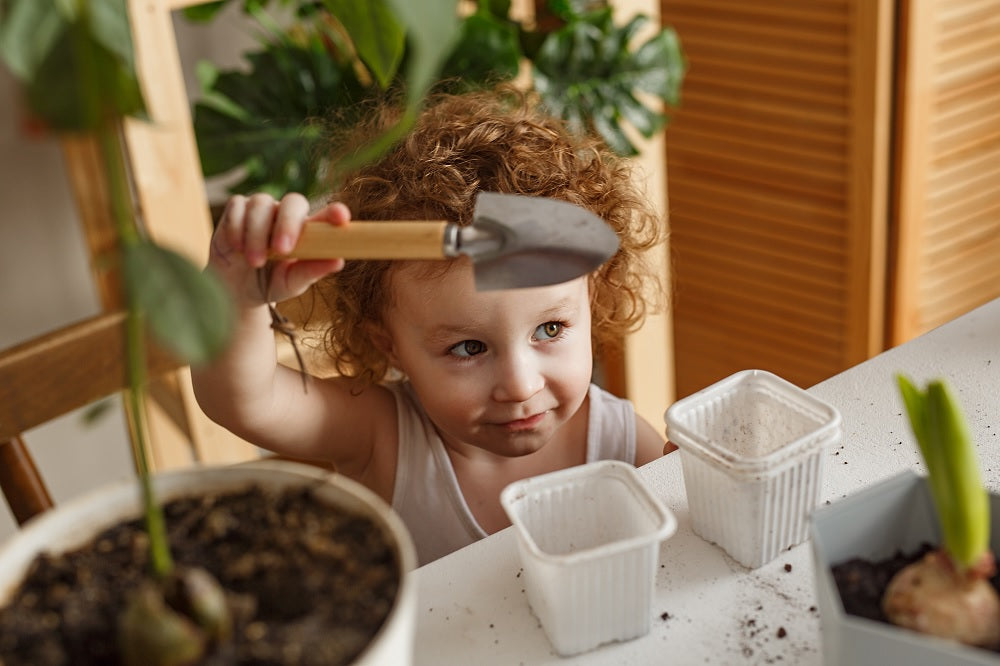Raising Eco-Conscious Kids: Montessori Activities for Sustainable Living

As environmental challenges become more pressing, it is crucial to nurture the next generation with values and habits that promote sustainable living and eco-consciousness. Montessori education emphasizes the interconnectedness of all living beings, fostering respect for the environment and a sense of responsibility towards our planet.
With Topponcino Company's commitment to providing educational, informative, and helpful Montessori resources, parents can cultivate a generation of eco-conscious children prepared to make a positive impact on our world.
In this comprehensive guide, we will unveil Montessori-inspired activities and ideas that promote ecological awareness and sustainable living in your child, regardless of their age. Our engaging and varied content focuses on fostering environmental respect, teaching essential skills for sustainable living, and introducing age-appropriate concepts related to recycling, conservation, and responsible consumption.
Introducing Environmental Education
The Montessori curriculum incorporates environmental education, fostering a deep love and respect for the planet. To lay a strong foundation for ecological awareness in your child, consider these age-appropriate activities:
- Nature exploration: Regular exposure to the natural world provides opportunities for children to develop an emotional connection to the environment. Encourage your child to explore parks, gardens, and walking trails.
- Wildlife observation: Ignite curiosity about the world's diverse ecosystems by observing plants and animals in your local area. Offer guidance in using binoculars, bird guides, and plant identification resources.
- Books and documentaries: Use age-appropriate books and documentaries to introduce essential environmental concepts such as recycling, natural resources, climate change, and habitat preservation.
Practical Life Skills for Sustainability
Montessori education emphasizes practical and useful life skills. Teaching your child everyday sustainable habits encourages responsibility and self-sufficiency. Try these Montessori-based activities to promote green living:
- Gardening: Involve your child in planting, maintaining, and harvesting a home garden. This hands-on experience fosters an appreciation for nature, develops motor skills, and contributes to a sense of accomplishment.
- Composting: Teach your child the fundamentals of composting and how it benefits the environment by reducing waste and enriching the soil.
- Energy conservation: Encourage your child to practice energy-saving habits such as turning off lights and appliances when not in use. Discuss renewable energy sources like solar and wind power to spark interest in eco-friendly alternatives.
Montessori-Inspired Recycling and Waste Management Activities
Recycling and waste management are fundamental components of sustainable living. Encourage your child to participate in recycling efforts and teach them proper waste management techniques through these Montessori activities:
- Sorting recyclables: Set up a home recycling station and involve your child in sorting recyclable materials such as paper, plastic, and glass. This activity promotes organizational skills and raises awareness about waste reduction.
- Upcycling art projects: Encourage creativity and resourcefulness by using recyclable materials for art projects. Transform old cereal boxes into picture frames or repurpose a tin can into a planter.
- Waste audit: Conduct a family 'waste audit' to track and analyze the amount of waste generated by your household. Brainstorm ideas for reducing waste production, such as using reusable shopping bags, containers, and cloth napkins.
Instilling Eco-Friendly Values
Cultivate an eco-conscious mindset in your child by incorporating environmental values into your family’s daily life. These simple strategies will help your child develop eco-friendly habits and beliefs:
- Modeling eco-conscious behavior: Children learn best by example. Demonstrate environmental responsibility through your actions, such as recycling, conserving water, and choosing eco-friendly products.
- Mindful consumption: Teach your child to appreciate and value their belongings. Encourage them to make informed decisions when purchasing items by researching product sustainability and companies' environmental practices.
- Community involvement: Encourage your child to participate in community-based environmental initiatives such as tree planting, beach cleanups, or local conservation projects. This exposure reinforces environmental values and promotes stewardship beyond the home.
Final Thoughts
Montessori-inspired activities offer parents a valuable framework for nurturing eco-conscious habits and environmental respect in their children. By implementing these practical strategies, you will establish a strong foundation for sustainable living and inspire your child to develop a mindful, responsible attitude toward the environment.
Begin your eco-conscious Montessori journey with our engaging activities and expert tips. Explore our comprehensive range of resources and cultivate a love for our planet in your child. Check out The Topponcino Company’s Montessori products to start raising eco-conscious children today!












